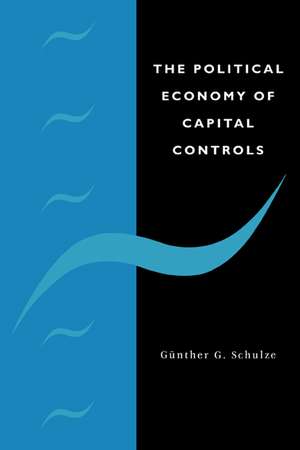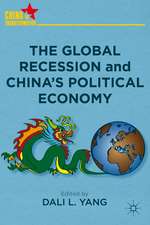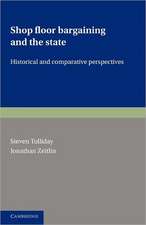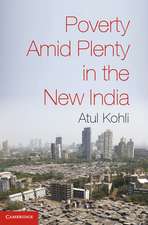The Political Economy of Capital Controls
Autor Gunther G. Schulzeen Limba Engleză Paperback – 9 iun 2010
| Toate formatele și edițiile | Preț | Express |
|---|---|---|
| Paperback (1) | 285.19 lei 6-8 săpt. | |
| Cambridge University Press – 9 iun 2010 | 285.19 lei 6-8 săpt. | |
| Hardback (1) | 712.25 lei 6-8 săpt. | |
| Cambridge University Press – 3 mai 2000 | 712.25 lei 6-8 săpt. |
Preț: 285.19 lei
Nou
Puncte Express: 428
Preț estimativ în valută:
54.60€ • 56.15$ • 45.29£
54.60€ • 56.15$ • 45.29£
Carte tipărită la comandă
Livrare economică 18 februarie-04 martie
Preluare comenzi: 021 569.72.76
Specificații
ISBN-13: 9780521142854
ISBN-10: 0521142857
Pagini: 300
Ilustrații: 11 tables
Dimensiuni: 152 x 229 x 17 mm
Greutate: 0.44 kg
Editura: Cambridge University Press
Colecția Cambridge University Press
Locul publicării:Cambridge, United Kingdom
ISBN-10: 0521142857
Pagini: 300
Ilustrații: 11 tables
Dimensiuni: 152 x 229 x 17 mm
Greutate: 0.44 kg
Editura: Cambridge University Press
Colecția Cambridge University Press
Locul publicării:Cambridge, United Kingdom
Cuprins
List of figures; List of tables; Preface; 1. Introduction; Part I. The Reasons for Capital Controls: 2. Political-economic determinants of capital controls; 3. Capital controls in a small open economy; 4. Extensions: large open economy and unemployment; Part II. The Evasion of Capital Controls: 5. Ways and means to escape the restrictions; 6. Misinvoicing international trade: imports; 7. Misinvoicing international trade: exports; Part III. Empirical Measurement of the Effectiveness of Capital Controls: 8. The effects of capital controls - unexploited profit opportunities?; 9. Return differentials; 10. The correlation of saving and investment; 11. Finale; Appendices; References; Index.
Recenzii
Review of the hardback: 'Gunther Schulze covers a wide range of theories on the motivations for capital controls and why they might fail. His eclectic work encompasses models of taxation drawn from real trade theory as well as from international money and finance. Always, the political-economic motivations of governments restricting capital flows, and the likely welfare consequences, get centre stage. A welcome consolidation and analytica elaboration of hitherto diffused writings in a most important area of international development.' Ronald McKinnon, Stanford University
Review of the hardback: 'This book provides a welcome analysis of international capital controls to complement the political-economy view of international trade policies. Traditional efficiency-related reasons for capital controls are examined and are found to be less effective in explaining observed policies than distributional consequences of capital movements. An extensive range of theoretical and empirical issues is investigated, including illegal avoidance and measurement of the effectiveness of capital controls. Throughout there is no presumption that, if a government has imposed capital controls, it must necessarily have done so in the best interests of society at large. Gunther Schulze has provided a comprehensive study of a topic that has not previously benefited from the insights of a political-economy perspective.' Arye L. Hillman, Bar-Ilan University, Israel
Review of the hardback: 'This book provides a welcome analysis of international capital controls to complement the political-economy view of international trade policies. Traditional efficiency-related reasons for capital controls are examined and are found to be less effective in explaining observed policies than distributional consequences of capital movements. An extensive range of theoretical and empirical issues is investigated, including illegal avoidance and measurement of the effectiveness of capital controls. Throughout there is no presumption that, if a government has imposed capital controls, it must necessarily have done so in the best interests of society at large. Gunther Schulze has provided a comprehensive study of a topic that has not previously benefited from the insights of a political-economy perspective.' Arye L. Hillman, Bar-Ilan University, Israel
Descriere
A comprehensive study of capital controls, assesses the existing literature and presents original research.
















